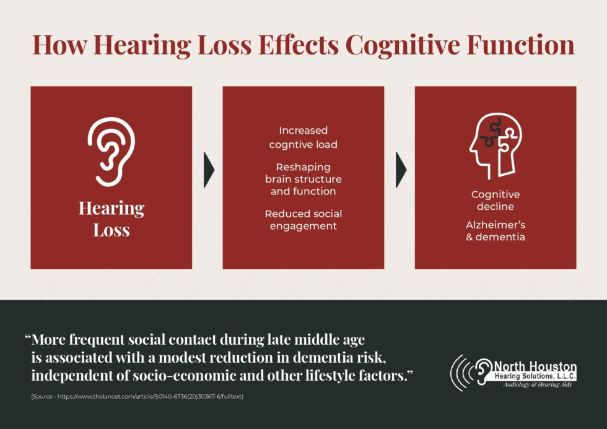Because of the connection between your hearing and cognitive impairment, North Houston Hearing Solutions uses cognitive screening in order to identify your level of cognitive function.
We’ve already addressed the five cognitive areas of screening involved in cognitive testing as well as how your cognitive assessment is self-administered, but how do our patients benefit from cognitive screening?
There is some fascinating science behind how hearing loss contributes to cognitive decline.
You hear with your ears, but you listen and understand with your brain. Without the ability to hear, the brain is unable to process sounds that engage cognition. Cognitive screening is used to enhance our ability to provide you with better hearing care.
How Hearing Impairment Contributes To Cognitive Decline
A study by Hannah Glick, AuD, PhD, and Anu Sharma, PhD published in Frontiers in Neuroscience (Feb 2020) indicated that “untreated hearing loss (even mild sensorineural hearing loss) is associated with neural reorganization and cognitive deficits.”
#1 Increased Cognitive Load
Issues that degrade the sound signal, like muffled sound transmission, an obstruction in the ear canal (conductive hearing loss), or sound coding and modification, are what cause the brain to compensate for poorly resolved sensory cues. This is the reason those with hearing challenges are often severely exhausted after conversations or attending social events.
#2 Reshaping Brain Structure And Function
Your brain’s neuroplasticity, (ability to adapt to changes) compensates for inadequate sensory cues by shifting cognitive functions to the hearing process, causing immediate and delayed recall to suffer, contributing to cognitive decline and dementia. “Auditory deprivation alters cortical and subcortical brain regions,” according to a March 2020 University of Montreal study, having a significant impact on behavior and neurocognitive capabilities.
#3 Reduced Social Engagement
Dementia prevention, intervention, and care, a report published by the Lancet Commission in 2020, indicated that “more frequent social contact during late middle age is associated with a modest reduction in dementia risk, independent of socio-economic and other lifestyle factors.”
Social isolation is common in individuals with a hearing loss for several reasons, including:
- Feelings of inadequacy
- Exhaustion
- Irritability from cognitive overload
- Loss of confidence in the ability to keep their balance
- Decreased enjoyment as they struggle to keep up with multiple conversations in a noisy environment.

What Processes Are Involved In Hearing And Understanding Speech?
Three processes are involved in hearing and understanding speech:
- Peripheral Auditory System – Detects sounds from the acoustic environment and codes them into neural signals for transmission to the central auditory system.
- Central Auditory System – Receives the coded messages from the peripheral auditory system, and modifies and analyzes them. Refines the signal and extracts important elements needed for higher-level processing. Emphasizes certain aspects of the incoming signal to make improvements in perception.
- Cognitive Processes – Receives the modified transmissions from the central auditory system and enhances their perception. Applies contextual understanding, and stores the information for later recall – applying various cognitive functions like attentiveness, listening effort, memory, multi-sensory integration, and speech prediction to enhance understanding.
A basic audiological workup focuses only on the first of these three processes, the peripheral auditory system. However, cognitive screening evaluates the other two processes involved in hearing and understanding speech as well.
What Cognitive Screening Tells Audiologists
Cognitive screening makes it possible for audiologists to evaluate expanded communications capacities that have a significant impact on how well you hear and understand speech, like:
- Listening skills
- Cognitive and linguistic interpretation
- Communication strategies
Essentially, we can better understand how your brain processes poorly interpreted auditory cues or sound signals due to hearing loss. The five areas tested during cognitive screening produce five scored results, each with a direct audiological connection.
Memory Score
Retaining information while simultaneously processing the same or new information is critical for sorting out complex sentences. Thinking and following abstract thoughts and comprehending speech in degraded sound environments are essential to understanding.
Visuospatial Score
Processing and interpreting visual information, like where things are in space and in relation to one another, reach beyond peripheral auditory processing. This score is based on the ability to locate where sounds come from, the effective use of visual cues, and the capacity to process complex sentences and speech in degraded sound environments.
Executive Function Score
Coordinating and controlling higher-order cognitive processes is the role of executive function. This guides attention, planning, problem-solving, and more. These skills are necessary to focus on a single speaker in noise or multiple speakers talking at the same time as well as the ability to ignore irrelevant distractions while focusing on speech stimuli.
Reaction Time
Measuring how quickly your brain coordinates between stimulus perception and response is a necessary part of responding with appropriate speed when sound or speech signals dictate a quick reaction.
Processing Speed
Evaluating how long it takes to mentally process a task indicates the ability to follow rapid and/or complex conversations, especially in degraded sound or listening environments.
How Cognitive Screening Is Applied To Hearing Care
Intervention is essential to limit the effects of cognitive decline and hearing loss on your quality of life. It affords you the ability to continue to live an independent lifestyle.
Incorporating information gathered from hearing tests along with cognitive screening helps audiologists design a more holistic approach to hearing care that deals with more than just the peripheral auditory issues, including:
- Cognitive Training – such as Brain HQ, Lumosity, and others like them- focuses on exercises designed to strengthen your brain’s cognitive function. Memory, attention, brain speed, people skills, intelligence, and navigation are all focused on.
- LACE is a form of aural rehabilitation that applies various auditory/cognitive strategies to deal with issues like picking out a voice in a noisy environment. This can also train your brain to understand fast talkers better and focus on the specific voice you want to hear when there are competing speakers. Target Word Cognitive training uses auditory memory to help you fill in the blanks that you don’t hear during a conversation.
- Hearing Aids – Glick and Sharma noted that the use of hearing aids “resulted in significant improvements in the domains of global cognitive function, executive function, processing speed, and visual working memory.” Further analysis also indicated that “reliance on cognitive function is greater in situations where the acoustic speech signal is unfavorable,” a problem modern hearing devices help solve.
- Speechreading/Cued Speech – Learning how to use visual cues from the speaker’s mouth, facial expressions, and hand movements to understand speech – especially in degraded listening environments.
- Auditory Training – This approach helps individuals with hearing challenges to recognize speech sounds, patterns, words, phrases, or sentences, helping them improve speech prediction cognitive ability.
- Manual Communication – Teaching communication via fingerspelling and sign language for those with a profound hearing loss is the focus of this form of aural rehabilitation.
Being able to do more than just fit our patients with a pair of hearing aids is an integral part of providing individualized hearing care that addresses the broader scope of issues associated with hearing loss.
Cognitive screening allows us to identify issues that go beyond the peripheral auditory system and treat outstanding problems associated with how your brain processes sound.
If you or a loved one is struggling with a hearing loss and you suspect it is having an impact on your cognitive abilities, your best chance of limiting the onset and effects of cognitive decline and dementia on your quality of life is to schedule a cognitive screening at North Houston Hearing Solutions.





